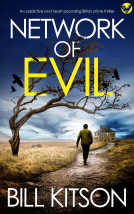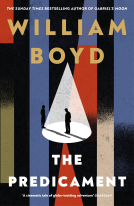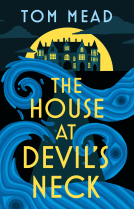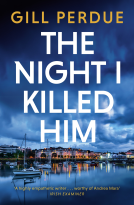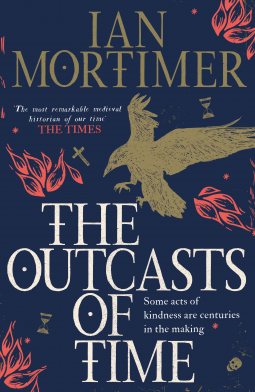
The Outcasts of Time
by Ian Mortimer
This title was previously available on NetGalley and is now archived.
Send NetGalley books directly to your Kindle or Kindle app
1
To read on a Kindle or Kindle app, please add kindle@netgalley.com as an approved email address to receive files in your Amazon account. Click here for step-by-step instructions.
2
Also find your Kindle email address within your Amazon account, and enter it here.
Pub Date Jul 01 2017 | Archive Date May 11 2017
Simon and Schuster | Simon & Schuster UK
Description
'This clever and moving Faustian tale is packed with fascinating historical detail' Express
'A joyous romp around England’s dark past' Suzie Feay, Guardian
From the author of the bestselling The Time Traveller's Guide to Restoration Britain, this is a stunningly high-concept historical novel that is both as daring as it is gripping, and perfect for fans of Conn Iggulden, SJ Parris and Kate Mosse.
December 1348. With the country in the grip of the Black Death, brothers John and William fear that they will shortly die and go to Hell. But as the end draws near, they are given an unexpected choice: either to go home and spend their last six days in their familiar world, or to search for salvation across the forthcoming centuries – living each one of their remaining days ninety-nine years after the last.
John and William choose the future and find themselves in 1447, ignorant of almost everything going on around them. The year 1546 brings no more comfort, and 1645 challenges them still further. It is not just that technology is changing: things they have taken for granted all their lives prove to be short-lived.
As they find themselves in stranger and stranger times, the reader travels with them, seeing the world through their eyes as it shifts through disease, progress, enlightenment and war. But their time is running out – can they do something to redeem themselves before the six days are up?
What readers are saying:
‘Wow, what a book! I absolutely adored this. This was ambitious but done to perfection’ Sara Marsden
‘The Outcasts of Time is a tour de force, rich in spellbinding detail. Haunting and atmospheric, there is warmth and humour alongside fear and torment; all human life is here. As perfect a novel as any I've ever read’ Ophelia’s Reads
'A fascinating trip through seven centuries of history ... The author has done well to traverse such a sweep of time ... it's a great read and I'd recommend it' Netgalley reviewer, 4 stars
A Note From the Publisher
A 'time slip' novel unlike any other, massively entertaining and incredibly informative. This is historical fiction at its most exciting.
Advance Praise
'The most remarkable medieval historian of our time' The Times
'The most remarkable medieval historian of our time' The Times
Marketing Plan
· Perfect for fans of Conn Iggulden, SJ Parris and Kate Mosse
· Social Media and direct to consumer campaign targeting fans of the genre and previous readers of his work
· Authored features and reviews in national press
· Broadcast coverage including Radio 4, Radio 2, Radio 5 Live and BBC World Service
· Widespread coverage in current affairs magazines, lifestyle magazines and literary press
· Features & interviews in history press & blogs
· Appearances at a wide range of literary events and festivals throughout the year
Available Editions
| EDITION | Other Format |
| ISBN | 9781471146558 |
| PRICE | £12.99 (GBP) |
Links
Featured Reviews
 M J P, Reviewer
M J P, Reviewer
I received a free E-Arc from Netgalley.
Ian Mortimer is a fantastic historian - looking at the past with new eyes and in so doing shedding light on events that are often, erroneously, presented as a fait accompli. For this reason, I was very excited to be given the opportunity to read and review his first work of fiction.
The Outcasts of Time is a deeply intriguing novel, looking not at the past through our perception, but rather the future (which is now our past) through the eyes of a man who lived over 600 years ago. This means that instead of our own misconceptions being applied to the past, every new century is seen afresh, with old eyes that note the changes and the differences as well as the similarities. That said, the novel is not always successful in doing this in an entertaining way, there are the odd occasions where I pondered whether the novel was actually going to be able to successfully bring to a conclusion what appears, at points, as nothing more than a random collection of chance encounters in and around the area of Exeter with different people throughout the 600 year period. I must point out, however, that in the end, I was very pleased to have all the events brought together and to be given some understanding of John's 'chance' encounters.
The initial portrayal of the Black Death is as bleak as we could expect, and edged with harshness. I can understand why the events drove John to seek the option of travelling into the future as opposed to his hideous and painful death. What then transpires is a painstakingly detailed tramp through both the historical and the physical landscape. The book covers a small geographical area - wherever John and his brother could walk in a day's journey. This feels, on occasion, a little restrictive, and yet the research involved in the endeavour can not be underestimated. Ian Mortimer has either envisaged, or drawn from the historical record, painstaking detail about the way the landscape, people and places changed throughout the 600 years from the Black Death. While this detail may occasionally slow the narrative it can not be ignored. What else would you notice if you did travel through time? It would be people's clothes, haircuts, the decorations in their houses, the style of buildings and the food available to eat - not to mention the changes in bathrooms.
The grander events of history - the well known wars and kings and queens - are touched upon but they don't constitute what John is hoping to achieve. He is looking for redemption - to save a soul in order to save his own - and his comments and feelings remain those of a man born and raised in the fourteenth century, confused and beguiled by events almost beyond his comprehension, which only increases with distance from his own time.
The author works hard to bring out every naunce of change through time - right down to evolving speech and the changing of names - by the end John is no longer John of Wrayment but John Everyman - time and language mangling his name, and depriving him of almost everything apart from his brother's ring and his memories. By making John a stone carver, the author even manages to show that even something as 'permanent' as stone can be mangled and broken through time - the carvings John has made, based on his family and friends, gradually fall away and lose their shape. Nothing, it seems, is ever permanent, no matter the initial intent.
The people John meets are perhaps a little too easily convinced of his journey through time, and I do feel that the last two centuries - the 1800's and 1900's perhaps work better - but that is probably because they are more 'real' to me - they are more comprehensible to me just as those centuries closer to John seem to make more sense to him. This, I think, is to be expected.
I would also add that quite a bit of the novel is concerned with religion and religious change. This is fascinating, but also, on occasion, a little overpowering, and yet reflects the concerns of John very eloquently. It shows how recently religion has ceased to be such a major presence in the lives of many.
When John offers the opinion that "The man who has no knowledge of the past has no wisdom" he is speaking for the rationale behind this novel and doing so very eloquently.
Recommended to all who enjoy history and historical fiction.
 sara m, Reviewer
sara m, Reviewer
Wow, what a book!
I absolutely adored this. I have a degree in History but used to be very hesitant to pick up Historical fiction but more recently I have found myself drawn to the genre.
This was ambitious but done to perfection.
The writing was beautiful and the character work was stunning. I think part of the success of this book comes from Mortimer's extensive work as a Historian as this is a great example of Historical fiction that blends fact from fiction.
 The Idle Woman ., Reviewer
The Idle Woman ., Reviewer
It’s 1348 and Devon is ravaged by the plague. Brothers John and William are walking home to Moreton near Exeter, but the pestilence catches up with them on the road. Sickened unto death, they stumble into a stone circle, where a mysterious voice speaks to them from the darkness. They have six days of life left and they have a choice. They can spend it here, in their own time, and accept whatever is coming to them after death. Or they can use those six days to do good in the world, each day to be lived 99 years after the one before, and to grow closer to redemption in the process. No prizes for guessing which they choose. As days and nights pass, each new dawn does away with almost a hundred years and, from 1447 to 1546, 1645, 1744, 1843 and 1942, our narrator John witnesses the changing face of the British countryside and its people.
On paper, the time-slip concept is great and reminded me of a picture-book I had as a child, called The Village. You turned pages to watch a village develop from a circle of thatched Saxon houses to a thriving town in the present day. But Mortimer’s book is obviously aimed at adults and, as John passes through time, he witnesses human nature in all its ugliness, becoming increasingly cruel and intolerant as the luxuries of the world become ever more unimaginable to a medieval mind. Yet the conclusion is hardly original: that the medieval world, for all its hardships, was a time of community spirit and good-fellowship while modern life, despite amazing technological advances, lacks compassion and social conscience. People have always found the present lacking in comparison to the true values of the ‘good old days’. There’s an almost Victorian moralism about this message.
And the same is true for the spiritual qualities of the book. I have to say that Mortimer does a fantastic job of getting inside the medieval mindset: everything is weighed down with spiritual significance and nothing matters more than the ultimate achievement of grace. I suppose much depends on whether a modern reader is willing to buy into the ‘race against time’ for John to save his soul. And there are still some slightly heavy-handed moments. The story begins with a pact with the devil (or an angel?) and ends with the judgement of the protagonist’s soul, so do we really need to have that hammered home by a 19th-century theatre trip to see Marlowe’s Doctor Faustus?
Mortimer’s Time Traveller’s Guides are written for the benefit of modern people who wonder what it would be like to suddenly wake up in the past. Effectively, what he’s doing here is using the same theory but in reverse. John and William become time-travellers in their own right, outsiders whose observations pick up on all the little things – not so much the names of the kings, or the fact we’re at war with France again, but the fact that houses now have glass in the windows, or the horses are taller, or there are strange tapestries on the floors, or people eat with strange two-pronged silver tools, or that ale has gone out of favour and people prefer to drink beer or strange hot mud-coloured drinks. They also note the absurdities. Why, when people are so much more comfortable, is war still necessary? Why are women suddenly forbidden to practice medicine? Why is one interpretation of religion seen as heresy, while another is accepted? In the greater scheme of things, all becomes ridiculous.
It is no accident that John’s name (‘of Wrayment’), interpreted phonetically in so many different ways throughout his journey, ends up being transliterated as ‘everyman’. As he passes through time, John witnesses the fate of the poor, the homeless and the needy. Sometimes he’s fortunate enough to meet a generous host who gives him food and shelter; sometimes he’s in the workhouse, spinning and being beaten as a vagrant. And, just like the protagonist of the medieval morality play, John realises that ultimately he can count on nothing – no possessions, no status, no manual abilities – good deeds account for all. It’s a strikingly medieval message for a modern world.
The full review will be published on my blog on 1 June 2017 at the following link:
https://theidlewoman.net/2017/06/01/the-outcasts-of-time-ian-mortimer
 Philipa C, Reviewer
Philipa C, Reviewer
This is a time traveller book I really enjoyed (against so so many I haven't).
It is December 1348 and brothers William and John are making their way home from Salisbury. The countryside and roads are covered in the bodies of victims of the plague (Black Death) which is sweeping the land. William (the older brother) is carefree and lusty as a young single man whereas John is a religiously devout family man, longing to return safely to his wife Catherine and three sons.
Danger and disease threaten their travels - firstly when William comes upon his lover and then when John decides to rescue a baby found alive beside his dead parents. His kindness leads to tragedy and both brothers fear for their own mortality. Blaming himself John seeks refuge amongst the stone carved heights of the cathedral where he is a mason/sculptor.
When the voice of the Devil offers him hope from death but that his life will take the form of 99 years passing in each of the next 7 days John agrees to the pact.
What follows is a fascinating trip through seven centuries of history, primarily based in Exeter and its environs but encompassing national and world events alongside the 'ordinary' lives of people John will meet as each day reveals a new set of challenges to his faith and his belief in the world around him.
The author has done well to traverse such a sweep of time and sometimes does slip up on what John might or might not have known as a stranger but overall its a great read and I'd recommend it.
 Hannah W, Reviewer
Hannah W, Reviewer
Actual rating 3.5
Historical fiction written by historians is amazing and there needs to be more of it.
I really appreciate what this book did in terms of looking at the past differently. The storytelling was very clever and I really wish we saw more historical fiction willing to look past the conventional story.
Unfortunately, I didn't read the description properly on NetGalley- which is entirely my fault- and hadn't realised that this book involves time travel and some small fantasy/sci-fi elements. I read that it involved the plague and immediately requested! I just happen prefer my historical fiction to be set in one period.
After I re-read the description after being approved for the book, I was convinced I would hate it, but it's actually much better than I thought it would be. This is down to the unique, intelligent storytelling.
I will be looking out for more Ian Mortimer!
It is several weeks since I finished this book and I’m still trying to decide what to make of it. I found it by turns puzzling, frustrating, impressive, thought-provoking, didactic and moving. Positioned as historical fiction, at times it seemed more like social history, political treatise, fantasy or philosophical debate. John’s and William’s journey is really a device to take the reader on a journey through time, charting changes in clothing, food, technology, architecture and religious debate. At times, this feels a little like a history lesson but an amazingly detailed and well-researched one, as you would expect from someone with the pedigree of Ian Mortimer.
Whatever period of history John and William arrive in, a constant is cruelty and inequality – plus ça change, plus c’est la mȇme chose seems to be the message. ‘I wonder what tomorrow will be like – whether the punishments of the landless and destitute will be even worse, and the haughtiness of the wealthy even greater.’ However, along the way John and William do encounter a few individuals who show them kindness or offer them assistance.
The brothers make entertaining companions on this journey through time with witty banter between the two of them masking an underlying deep affection. Their reaction to some of the new things they encounter is amusing. John and William also represent opposing sides of a debate about faith versus atheism. Although both have a desire to do good deeds, their motivation is very different.
While reading the book, I found myself pondering intertextual influences ranging from H G Wells’ The Time Machine, through Marlowe’s Dr Faustus, Mark Twain’s A Connecticut Yankee in the Court of King Arthur to Bunyan’s The Pilgrim’s Progress, with William representing the character, Faithful.
The ending is both moving and thought-provoking. I think this book will divide readers.
I received an advance reader copy courtesy of NetGalley and publishers, Simon & Schuster UK, in return for an honest review.
 Annemarie M, Educator
Annemarie M, Educator
A brilliantly written and thought-provoking book, which ensures the reader is not only taken on a journey through time and history, but also that they take the time to search their own selves for what it means to be truly good or do a truly good act. The soul-searching is prevalent throughout the book and it is through the thoughts and angst of the protagonist, John, that we are able to explore a range of thoughts and feelings about humanity, love and selflessness.
The genre is that of a time travelling plot, at times reminiscent of a mix between Dickens' 'A Christmas Carol' and 'The Greatest Gift'/'It's a Wonderful Life', whereby we are forced to think about our actions and the effect on others, along with what difference we make existing at all. Throughout the engaging plot, the reader is thrust along, desperately seeking what John himself seeks - the answer to it all and the need to know that we are worthy. It is through Mortimer's excellent characterisation of a simplistic, yet wholly realistic, John of Wrayment (along with the varied other names he comes to be known as), that we are fully immersed in the events of the novel and of the many historical points in history, focusing particularly on human actions and the treatment of others over the centuries.
The wealth of historical detail comes from the vast experience of the author, which he puts to good use in the first of this fictional exploits. Here we are presented with two ordinary men hailing from the Exeter area of Devon, in the year of 1348, a plague-ridden, deathly year for many. Possibly carrying the disease themselves, John and his brother, William, are given a choice before they reach home: to continue home and risk infecting their loved ones, culminating in their own deaths very soon, or they can live on for 6 more days and have the chance to redeem themselves and save their souls. The catch is that this latter option comes with a proviso: they must move forward 99 years into the future with each day they live. Choosing the latter, John and William have to face an endless range of challenges, not least of which is not understanding the world or the people around them and facing a long list of dangerous situations.
There is so much detail here that the reader will never get bored or lose their enthusiasm for the narrative. It is endlessly challenging and thought-provoking and it does present endless questions about the lives we live and the way we treat or think about others. The end, particularly is very poignant and heartfelt, making it well worth the read. For those who enjoy history, historical fiction and a deeply felt and moving read, this is worthy of your time.
